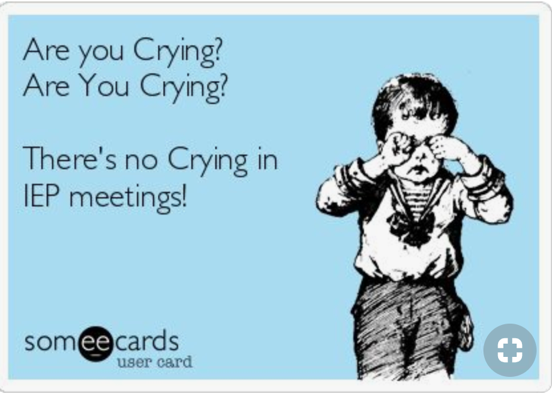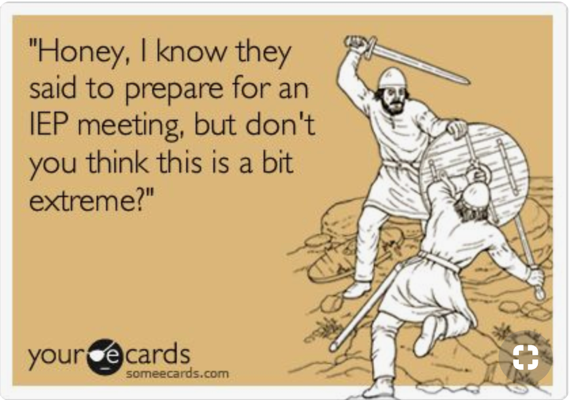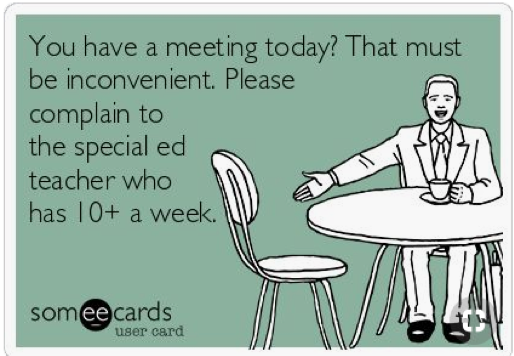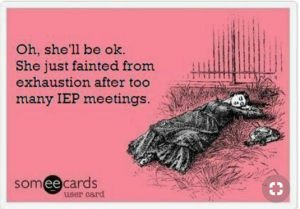I have literally been in hundreds of IEP Meetings throughout my career. As a student, teacher, and administrator. Yes, I had an Individual Education Plan from preschool until about 2nd grade so that I could receive speech services.
Now let’s be clear here, I was in 2nd grade, I do not recall attending these meetings as a student; however, 10 Years after I graduated High School I went back and to obtain my records before they were disposed of forever. As I read through them, now with my teaching lens on, I was shocked to see I had an IEP and attended a few of my annual meetings. I knew, from stories and watching old family videos, that I had some pronunciation issues, honestly I still do, but I had no clue I received speech services.
I was shocked as I read through my IEP documents. It was so sterile, I read through assessment data points, goals, and evaluations but nowhere in the documents did it talk about me as a person, my personality, likes/dislikes, etc. My heart broke a bit while reading through my file. This led me to become more reflective of what information I brought to my IEP meetings as a teacher.
 At this point in my career, educational funding was being cut left and right, as such, so were the services we were providing our students. Unfortunately, I was starting to feel the impact of the budget cuts in my classroom as my students’ paraprofessional minutes were also being cut left and right. My students needed these minutes and they were being stripped from them. I tried to stay calm during these meetings (which is very hard for me to do when I am passionate about something) but what was happening during these meetings was unjust.
At this point in my career, educational funding was being cut left and right, as such, so were the services we were providing our students. Unfortunately, I was starting to feel the impact of the budget cuts in my classroom as my students’ paraprofessional minutes were also being cut left and right. My students needed these minutes and they were being stripped from them. I tried to stay calm during these meetings (which is very hard for me to do when I am passionate about something) but what was happening during these meetings was unjust.
The IEP team would sit around the table talking about MY student like they were an object. Listing data points, reviewing anecdotal notes from a 10-minute classroom observation that took place during Read Aloud, when the student doesn’t require support. I would leave these meetings feeling totally deflated, like I failed this child and their family. I wasn’t being a big enough advocate, I was being talked TO not WITH as we made educational decisions. Something had to change….so I got to work!
I took over my students’ IEP meetings. I gave parents the time and courtesy to talk about their child, to address what they felt, observed, and wanted from the meeting. I talked with the team about my student. I tried to paint a picture of who this student was beyond data points and statistics.
 Did this make for a lengthier meeting? – Yes, it did.
Did this make for a lengthier meeting? – Yes, it did.
And did this frustrate people? – Of course!
Did members of the IEP team talk about me behind my back? – Yup!
But I was okay with that, I connected the data that the psychologist, special education teacher, and specialists (Speech, OT/PT, Social Worker, etc.) had with personable stories from the classroom. I knew my students and what they needed. It was my job to be their advocate!
I saw the benefits of this change:
- Academically – My students’ services weren’t being stripped from them.
- Socially – My families felt like they were a part of the IEP process, not that it was happening to them.
- Relationships – Overtime I grew very close with my school’s IEP team and looked forward to the meetings as they became a time where the team was focusing on getting to know my student and having great discussions about best practices.
By the time we were a well-oiled machine and I was no longer dreading my IEP meetings, I made a life change and became a principal in another district.
 As I was putting together my first IEP sub-schedule as the principal I became nervously excited, what was the climate and culture of the IEP meetings within this district?
As I was putting together my first IEP sub-schedule as the principal I became nervously excited, what was the climate and culture of the IEP meetings within this district?
After the first 15 minutes of the meeting, I was surprised with how little the general education teacher shared. She welcomed the parents and gave a brief report out on the student’s current academic levels and that was it! She was silent the rest of the meeting. Once again, I needed to change the policies and procedures of our IEP meetings. After a lot of relationship building and professional learning, we were able to move the pendulum and make significant changes in the way we do business as a community of learners during our IEP meetings!!
Here are a few tips and tricks on how to humanize the IEP process:
- Remember that you are talking about STUDENTS. They are people, they are someone’s everything! Talk about their personality, likes/dislikes, share personal stories.
- An IEP meeting should never be the first time a concern is brought to the team and/or parent – No Surprises!!
- Be prepared – bring work samples and be ready to give your opinion on other’s data.
- Be welcoming and smile. IEP meetings are exhausting and can be very nerve-racking for families as they stare and a bunch of strangers evaluating their child.
- Listen to parent concerns and give them time to share their perspective.
- Sustain relationships – when addressing the team focus on the “We”. It is a team working collaboratively to provide services for the child.
- Enjoy the opportunity to talk about your student. IEP meetings are a lot of work, preparing data, finishing reports, evaluations, sub plans… it’s exhausting. Don’t rush the meeting, if you are on a time crunch and are running short, end the meeting and schedule another time to meet.
 Please don’t hesitate to reach out to me if you find yourself frustrated with your building or district’s IEP process – I would love to come support you and your stakeholders in creating a more collaborative and welcoming meeting environment!
Please don’t hesitate to reach out to me if you find yourself frustrated with your building or district’s IEP process – I would love to come support you and your stakeholders in creating a more collaborative and welcoming meeting environment!
Katie Algrim – Director of Innovative Professional Learning
(t):630-444-3044
(c):630-675-4447
(e):kalgrim@kaneroe.org
